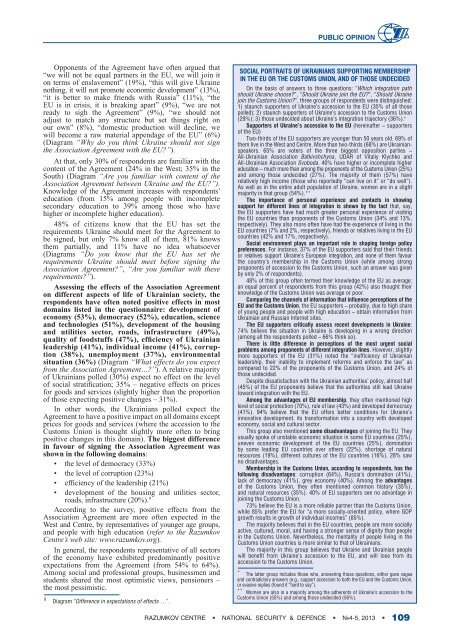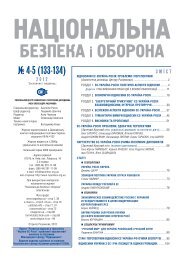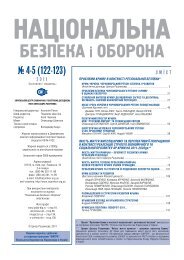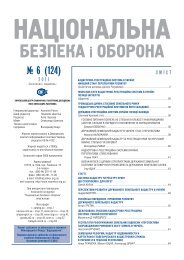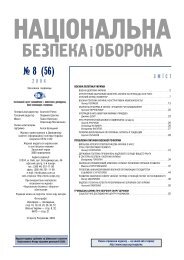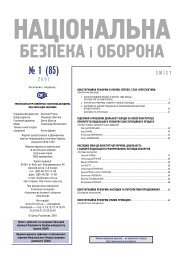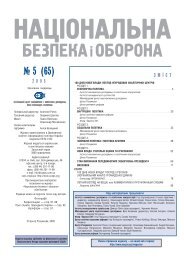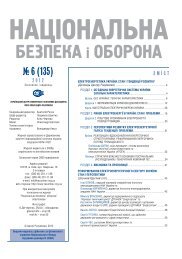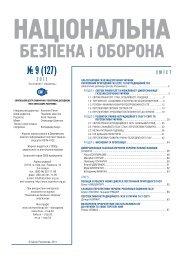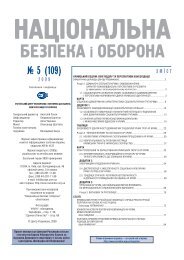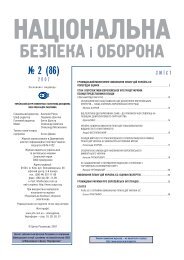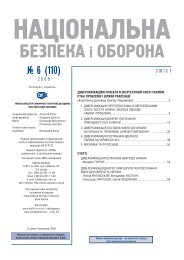RUSSIA THE EURASIAN CUSTOMS UNION AND THE EU COOPERATION STAGNATION OR RIVALRY?
RUSSIA, THE EURASIAN CUSTOMS UNION AND THE EU ...
RUSSIA, THE EURASIAN CUSTOMS UNION AND THE EU ...
- No tags were found...
Create successful ePaper yourself
Turn your PDF publications into a flip-book with our unique Google optimized e-Paper software.
PUBLIC OPINION<br />
Opponents of the Agreement have often argued that<br />
“we will not be equal partners in the <strong>EU</strong>, we will join it<br />
on terms of enslavement” (19%), “this will give Ukraine<br />
nothing, it will not promote economic development” (13%),<br />
“it is better to make friends with Russia” (11%), “the<br />
<strong>EU</strong> is in crisis, it is breaking apart” (9%), “we are not<br />
ready to sigh the Agreement” (9%), “we should not<br />
adjust to match any structure but set things right on<br />
our own” (8%), “domestic production will decline, we<br />
will become a raw material appendage of the <strong>EU</strong>” (6%)<br />
(Diagram “Why do you think Ukraine should not sign<br />
the Association Agreement with the <strong>EU</strong>?”).<br />
At that, only 30% of respondents are familiar with the<br />
content of the Agreement (24% in the West; 35% in the<br />
South) (Diagram “Are you familiar with content of the<br />
Association Agreement between Ukraine and the <strong>EU</strong>?”).<br />
Knowledge of the Agreement increases with respondents’<br />
education (from 15% among people with incomplete<br />
secondary education to 39% among those who have<br />
higher or incomplete higher education).<br />
48% of citizens know that the <strong>EU</strong> has set the<br />
requirements Ukraine should meet for the Agreement to<br />
be signed, but only 7% know all of them, 81% knows<br />
them partially, and 11% have no idea whatsoever<br />
(Diagrams “Do you know that the <strong>EU</strong> has set the<br />
requirements Ukraine should meet before signing the<br />
Association Agreement?”, “Are you familiar with these<br />
requirements?”).<br />
Assessing the effects of the Association Agreement<br />
on different aspects of life of Ukrainian society, the<br />
respondents have often noted positive effects in most<br />
domains listed in the questionnaire: development of<br />
economy (53%), democracy (52%), education, science<br />
and technologies (51%), development of the housing<br />
and utilities sector, roads, infrastructure (49%),<br />
quality of foodstuffs (47%), efficiency of Ukrainian<br />
leadership (41%), individual income (41%), corruption<br />
(38%), unemployment (37%), environmental<br />
situation (36%) (Diagram “What effects do you expect<br />
from the Association Agreement…?”). A relative majority<br />
of Ukrainians polled (30%) expect no effect on the level<br />
of social stratification; 35% – negative effects on prices<br />
for goods and services (slightly higher than the proportion<br />
of those expecting positive changes – 31%).<br />
In other words, the Ukrainians polled expect the<br />
Agreement to have a positive impact on all domains except<br />
prices for goods and services (where the accession to the<br />
Customs Union is thought slightly more often to bring<br />
positive changes in this domain). The biggest difference<br />
in favour of signing the Association Agreement was<br />
shown in the following domains:<br />
• the level of democracy (33%)<br />
• the level of corruption (23%)<br />
• efficiency of the leadership (21%)<br />
• development of the housing and utilities sector,<br />
roads, infrastructure (20%). 9<br />
According to the survey, positive effects from the<br />
Association Agreement are more often expected in the<br />
West and Centre, by representatives of younger age groups,<br />
and people with high education (refer to the Razumkov<br />
Centre’s web site: www.razumkov.org).<br />
In general, the respondents representative of all sectors<br />
of the economy have exhibited predominantly positive<br />
expectations from the Agreement (from 54% to 64%).<br />
Among social and professional groups, businessmen and<br />
students shared the most optimistic views, pensioners –<br />
the most pessimistic.<br />
9<br />
Diagram “Difference in expectations of effects …”.<br />
SOCIAL P<strong>OR</strong>TRAITS OF UKRAINIANS SUPP<strong>OR</strong>TING MEMBERSHIP<br />
IN <strong>THE</strong> <strong>EU</strong> <strong>OR</strong> <strong>THE</strong> <strong>CUSTOMS</strong> <strong>UNION</strong>, <strong>AND</strong> OF THOSE UNDECIDED<br />
On the basis of answers to three questions: “Which integration path<br />
should Ukraine choose?”, “Should Ukraine join the <strong>EU</strong>?”, “Should Ukraine<br />
join the Customs Union?”, three groups of respondents were distinguished:<br />
1) staunch supporters of Ukraine’s accession to the <strong>EU</strong> (35% of all those<br />
polled); 2) staunch supporters of Ukraine’s accession to the Customs Union<br />
(29%); 3) those undecided about Ukraine’s integration trajectory (36%).*<br />
Supporters of Ukraine’s accession to the <strong>EU</strong> (hereinafter – supporters<br />
of the <strong>EU</strong>)<br />
Two-thirds of the <strong>EU</strong> supporters are younger than 50 years old. 69% of<br />
them live in the West and Centre. More than two-thirds (68%) are Ukrainianspeakers.<br />
65% are voters of the three biggest opposition parties –<br />
All-Ukrainian Association Batkivshchyna, UDAR of Vitaliy Klychko and<br />
All-Ukrainian Association Svoboda. 40% have higher or incomplete higher<br />
education – much more than among the proponents of the Customs Union (25%)<br />
and among those undecided (27%). The majority of them (57%) have<br />
relatively high income (those who reportedly “can live on it” or “do well”).<br />
As well as in the entire adult population of Ukraine, women are in a slight<br />
majority in that group (54%).**<br />
The importance of personal experience and contacts in showing<br />
support for different lines of integration is shown by the fact that, say,<br />
the <strong>EU</strong> supporters have had much greater personal experience of visiting<br />
the <strong>EU</strong> countries than proponents of the Customs Union (34% and 13%,<br />
respectively). They also more often have had the experience of living in the<br />
<strong>EU</strong> countries (7% and 2%, respectively), friends or relatives living in the <strong>EU</strong><br />
countries (42% and 17%, respectively).<br />
Social environment plays an important role in shaping foreign policy<br />
preferences. For instance, 37% of the <strong>EU</strong> supporters said that their friends<br />
or relatives support Ukraine’s European integration, and none of them favour<br />
the country’s membership in the Customs Union (while among strong<br />
proponents of accession to the Customs Union, such an answer was given<br />
by only 2% of respondents).<br />
48% of this group often termed their knowledge of the <strong>EU</strong> as average;<br />
an equal percent of respondents from this group (42%) also thought their<br />
knowledge of the Customs Union was average or poor.<br />
Comparing the channels of information that influence perceptions of the<br />
<strong>EU</strong> and the Customs Union, the <strong>EU</strong> supporters – probably, due to high share<br />
of young people and people with high education – obtain information from<br />
Ukrainian and Russian Internet sites.<br />
The <strong>EU</strong> supporters critically assess recent developments in Ukraine:<br />
74% believe the situation in Ukraine is developing in a wrong direction<br />
(among all the respondents polled – 66% think so).<br />
There is little difference in perceptions of the most urgent social<br />
problems among proponents of different integration lines. However, slightly<br />
more supporters of the <strong>EU</strong> (31%) noted the “inefficiency of Ukrainian<br />
leadership, their inability to implement reforms and enforce the law” as<br />
compared to 22% of the proponents of the Customs Union, and 24% of<br />
those undecided.<br />
Despite dissatisfaction with the Ukrainian authorities’ policy, almost half<br />
(45%) of the <strong>EU</strong> proponents believe that the authorities still lead Ukraine<br />
toward integration with the <strong>EU</strong>.<br />
Among the advantages of <strong>EU</strong> membership, they often mentioned high<br />
level of social protection (70%), rule of law (43%) and developed democracy<br />
(41%). 94% believe that the <strong>EU</strong> offers better conditions for Ukraine’s<br />
innovative development, its transformation into a country with developed<br />
economy, social and cultural sector.<br />
This group also mentioned some disadvantages of joining the <strong>EU</strong>. They<br />
usually spoke of unstable economic situation in some <strong>EU</strong> countries (25%),<br />
uneven economic development of the <strong>EU</strong> countries (25%), domination<br />
by some leading <strong>EU</strong> countries over others (22%), shortage of natural<br />
resources (19%), different cultures of the <strong>EU</strong> countries (16%). 28% saw<br />
no disadvantages.<br />
Membership in the Customs Union, according to respondents, has the<br />
following disadvantages: corruption (64%), Russia’s domination (41%),<br />
lack of democracy (41%), grey economy (40%). Among the advantages<br />
of the Customs Union, they often mentioned common history (35%),<br />
and natural resources (35%). 40% of <strong>EU</strong> supporters see no advantage in<br />
joining the Customs Union.<br />
73% believe the <strong>EU</strong> is a more reliable partner than the Customs Union,<br />
while 85% prefer the <strong>EU</strong> for “a more socially-oriented policy, where GDP<br />
growth results in growth of individual incomes” (85%).<br />
The majority believes that in the <strong>EU</strong> countries, people are more socially<br />
active, cultured, moral, and having a stronger sense of dignity than people<br />
in the Customs Union. Nevertheless, the mentality of people living in the<br />
Customs Union countries is more similar to that of Ukrainians.<br />
The majority in this group believes that Ukraine and Ukrainian people<br />
will benefit from Ukraine’s accession to the <strong>EU</strong>, and will lose from its<br />
accession to the Customs Union.<br />
* The latter group includes those who, answering those questions, either gave vague<br />
and contradictory answers (e.g., support accession to both the <strong>EU</strong> and the Customs Union,<br />
or evasive replies (found it “hard to say”).<br />
** Women are also in a majority among the adherents of Ukraine’s accession to the<br />
Customs Union (55%) and among those undecided (56%).<br />
RAZUMKOV CENTRE • NATIONAL SECURITY & DEFENCE • №4-5, 2013 • 109


